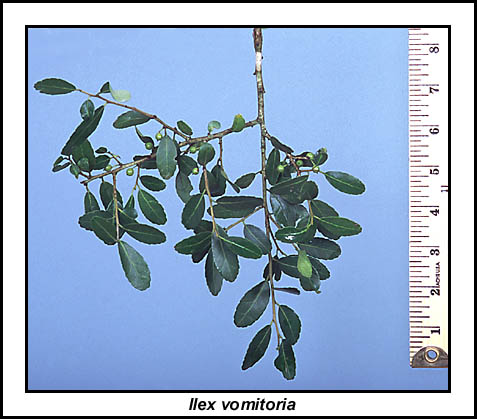Yaupon Holly
Ilex vomitoria
Family: Aquifoliaceae
Natural History

Yaupon holly, sometimes called just yaupon, is a fast-growing native of the southeastern United States. It sprouts readily from roots and is widely dispersed by birds that consume its berries. It grows in a wide variety of habitats including scrub, upland forests, and coastal areas.
Yaupon is an important wildlife food especially during winter months when the persistent berries are eaten by numerous birds and mammals. Wild turkey, bob-white quail, bluejays, mockingbirds, and towhees all consume the fruits along with raccoons, skunks, opossums, and rodents. White-tailed deer also browse on the vegetation. The foliage provides nesting sites and protective cover as well.
American Indians used the foliage of this shrub for medicinal and ceremonial purposes. Tribes would gather the leaves to brew a tea-like drink called 'black drink'. Since leaves and twigs of yaupon holly contain caffeine, the black drink would be high in caffeine and was also used to cause vomiting, hence the specific epithet of "vomitoria."
The evergreen foliage and bright red berries make it a popular Christmas decoration and landscape plant. The trees are often trimmed into hedges for natural screening or borders and used in the art of topiary or plant sculpture since it prunes easily. Yaupon is very tolerant of drought and sea salt.
Yaupon holly is similar to dahoon holly (Ilex cassine) but yaupon has smaller, more elliptical leaves with margins that are more toothed.
Yaupon holly grows from Virginia to Florida and west to Texas and Oklahoma. It is found at elevations up to 500'.
